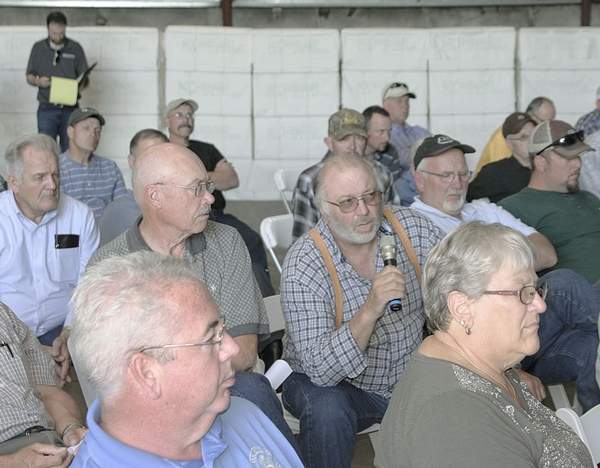forum
library
tutorial
contact

Farmers Ponder Options Following
Loss of Portland Container Carriers
by Matthew Weaver
Capital Press, May 29, 2015
|
the film forum library tutorial contact |

|
Farmers Ponder Options Following
by Matthew Weaver
|
Gene Butler is worried growers will lose the Lewiston port if it doesn't remain active. "This is the end of the line for
the river traffic, this is the last sea port from Portland," he says. "We'll surely lose it if we don't use it and keep it going."
 LEWISTON, Idaho -- Farmers should tell Congress how labor problems and the related loss of container carriers at the Port of Portland are impacting their wallets, a Washington state hay exporter says.
LEWISTON, Idaho -- Farmers should tell Congress how labor problems and the related loss of container carriers at the Port of Portland are impacting their wallets, a Washington state hay exporter says.
Mike Hajny, vice president of Wesco International in Ellensburg, Wash., recommended farmers speak to members of Congress in an effort to change the labor law that allowed the longshore union to slow container traffic at West Coast ports.
Many agricultural products, including hay, potatoes and apples, are shipped via containers to customers in Asia and elsewhere.
The longshoremen have signed a five-year contract, but the issues will resurface again, Hajny said. It will have a "trickle-down effect" on West Coast farmers for years to come, who "absolutely, positively" lost market share with overseas customers who moved on to suppliers in other countries when they couldn't get it from the United States during the labor dispute, he said.
"It's made the U.S. West Coast an unreliable supplier," he said.
Citing long loading and unloading times at the port, container carriers Hapag-Lloyd of Germany and Hanjin Shipping of South Korea pulled out of the Port of Portland early this year.
Of the 99 port districts in the Pacific Northwest, now only the ports of Seattle and Tacoma export containers, said David Doeringsfeld, Port of Lewiston manager.
"We've got a backlog of some product already, we've got new crops coming on that need shipped," said Terry Largent, board member for the Latah County Farm Bureau. A wide variety of commodities is affected, including pulses, hay, potatoes, vegetables and apples, he said.
The situation impacts farmers' bottom lines, likely tripling freight costs and affecting overseas markets, Largent said.
Tim McGreevy, CEO of the USA Dry Pea and Lentil Council, said he is concerned that the loss of container carriers comes as pulse production is expected to increase. Between 55,000 and 60,000 metric tons of pulse crops -- roughly 2,300 to 2,500 containers -- were shipped to the Port of Portland from Lewiston in 2014, he said.
McGreevy expects to see growers relying more on truck traffic to the ports of Seattle and Tacoma, increasing congestion there.
"We have to have good transportation systems, because we can add more acres, but if we have no efficient way to ship it, it's really going to cost our growers, processors and exporters dearly," McGreevy said.
McGreevy is hopeful the port can attract smaller carriers to resume container shipments at the Port or Portland, although the prospects aren't good in the short term, he said.
A grassroots effort by farmers may be the best bet, said Steve Claassen, chairman of the Washington Grain Commission. He'd like to see the industry develop a way to handle future labor issues.
One idea that has been floated is to add the ports to the Railway Labor Act, which bans work slowdowns or strikes by railroad and airline unions. Under that law, labor disputes must go through mediation.
"We have to have a plan, because it's not going to go away," Claassen said.
"If we get enough awareness, maybe we can get enough people involved to create a solution," Largent said. "We've got five years to get this done, we better do it in four."
learn more on topics covered in the film
see the video
read the script
learn the songs
discussion forum
